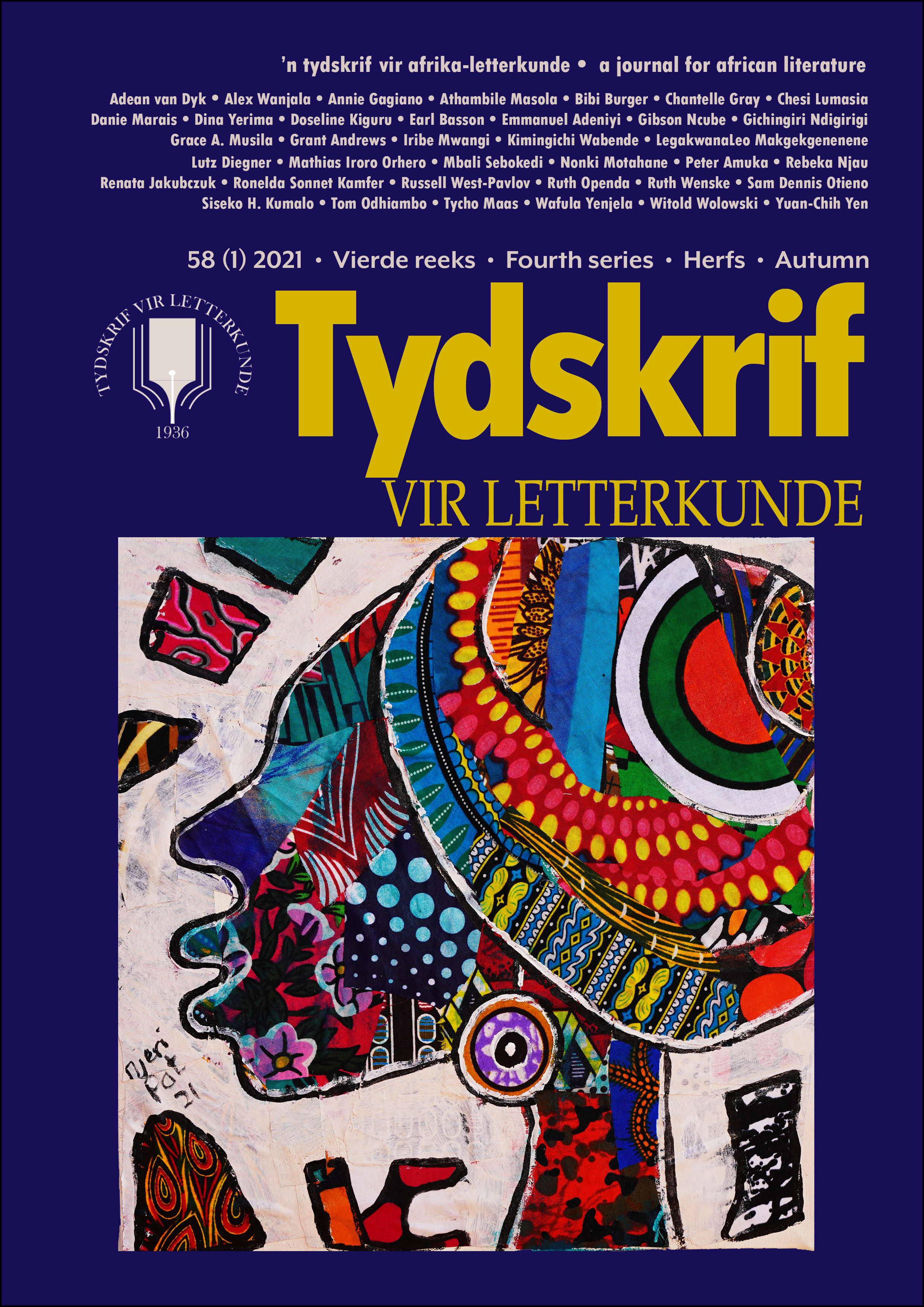African literature, metonymic gaps, and the Gandasation of metropolitan language in Jennifer Makumbi’s Kintu
DOI:
https://doi.org/10.17159/tl.v58i1.8272Keywords:
Jennifer Makumbi, world and African literatures, Buganda/Ugandan historiography, Gilles Deleuze, Félix GuattariAbstract
African literature has its roots in the continent’s oral traditions, while its written mode started as an offshoot of European colonialism. The literature is characterised by paradoxes, one of which is linguistic dissonance. The linguistic incongruity draws attention to the illogicality of African literature ventilating indigenous episteme through exogenous tongues. Though the question of linguistic discordance in African literature is not new, it still generates ripples, and currently attracts tremendous interest of the present crop of African women writers who produce texts that conflate both indigenous and exogenous languages to possibly strengthen the conviction that one language is no longer the sole organiser of worldview. Jennifer Makumbi is one such writer. The Ugandan has succeeded in writing herself into global reckoning by telling a completely absorbing, canon-worthy epic. In her narration of a riveting multi-layered historiography of Buganda/Ugandan nation in Kintu (2014), the novelist bridges metonymic gaps between Luganda and English. She attenuates the expressive strength of English and projects Luganda as another veritable source of knowledge generation. In this article I examine how Makumbi bridges cultural and linguistic gaps in the novel. I employ metonymic gaps as a conceptual model to expound the deployment of indigenous knowledges in a Europhone African text. I mine the overall implications of this practice in African literature, and argue that Makumbi aggrandises Luganda epistemology to resist European heteronomy of African literary expression. Consequently, her text becomes a site of postcolonial disputations where marginal and minor literatures/cultures jostle for supremacy.
Downloads
Metrics
References
Amolo, Joseph K. “(Re)-Mythification of (B) Uganda in Jennifer Makumbi’s Kintu.” MA thesis. U of Nairobi, 2017.
Ashcroft, Bill. “Bridging the Silence: Inner Translation and the Metonymic Gap.” Language and Translation in Postcolonial Literatures: Multilingual Contexts, Translational Texts, edited by Simona Bertacco. Routledge, 2014, pp. 43–70.
Ashcroft, Bill, Gareth Griffiths & Helen Tiffin. Post-Colonial Studies: The Key Concepts. 2nd edition. Routledge, 1995.
Ayeleru, Babatunde. “Towards a Metaphtonymic Reading of Adelaide Fassinou’s Prose Fiction.” Language, Literature and Criticism: Essays in Honour of Professor Aduke Adebayo, edited by Emmanuel N. Kwofie & Babatunde Ayeleru. Zenith, 2010, pp. 19–29.
Chennells, Anthony. “Essential Diversity: Post-Colonial Theory and African Literature.” Brno Studies in English vol. 25, 1999, pp. 109–26.
Cooper, Brenda. A New Generation of African Writers: Migration, Material Culture and Language. U KwaZulu-Natal P, 2008.
Dalley, Hamish. “The Idea of ‘Third Generation Nigerian Literature’: Conceptualizing Historical Change and Territorial Affiliation in the Contemporary Nigerian Novel.” Research in African Literature vol. 44, no. 4, 2013, pp. 15–34. DOI: https://doi.org/10.2979/reseafrilite.44.4.15.
Deleuze, Gilles & Félix Guattari. Kafka: Toward a Minor Literature. Trans. Dana Polan. Minnesota U P, 1986.
Ede, Amatoritsero. “The Global Literary Canon and Minor African Literatures.” PhD Diss. Carleton U, 2013.
Eze, Chielozona. “Feminist Empathy: Unsettling African Cultural Norms in The Secret Lives of Baba Segi’s Wives.” African Studies vol. 74, no. 3, 2015, pp. 310–26. DOI: https://doi.org/10.1080/00020184.2015.1067996.
Fanon, Franz. The Wretched of the Earth. Grove, 1963.
Farelius, Birgitta. “Where does the Hamite Belong?” Nomadic Peoples no. 32, 1993, pp. 107–18. http://www.jstor.org/stable/43123399.
Gichure, Christine W. “Human Nature/Identity: The Ubuntu World View and Beyond.” Human Nature: Stable and/or Changing?, edited by John P. Hogan. The Council for Research in Values and Philosophy, 2013, pp. 115–45.
Gordon, Joan. “Utopia, Genocide, and the Other.” Edging into the Future: Science Fiction and Contemporary Cultural Transformation, edited by Veronica Hollinger & Joan Gordon. U of Pennsylvania P, 2002, pp. 204–17.
Ilo, Isaiah U. Language Aesthetics of Modern African Drama. Tishbeth, 2013.
Kathy in Kenya. “Kangas, Kikoys and Kitenges”. 13 Jun. 2019. https://kathyinkenya2018.wordpress.com/2019/06/13/kangas-kikoys-and-kitenges/.
Kellman, Steven G., ed. Magill’s Survey of World Literature. Salem, 1993.
Lazo, Irete. The Accidental Santera. St. Martin’s, 2008.
Ljuckanov, Jordan. “Introduction: Translating a Small Literature to the Global Market. The Bulgarian Case and Beyond.” Studi Slavistici vol. 11, 2014, pp. 215–23. DOI: https://doi.org/10.13128/Studi_Slavis-15355.
Makumbi, Jennifer N. The First Woman. Oneworld Book, 2020.
Makumbi, Jennifer N. A Girl is a Body of Water. Tin House, 2020.
Makumbi, Jennifer N. Kintu. Kwani Trust, 2014.
Makumbi, Jennifer N. Manchester Happened. Oneworld Book, 2019.
Márquez, Gabriel G. One Hundred Years of Solitude. Trans. Gregory Rabassa. Perennial Classics, 1998.
Ngugi wa Thiong’o. “The Language of African Literature.” African Literature: An Anthology of Criticism and Theory, edited by Tejumola Olaniyan & Ato Quayson. Blackwell, 2007, pp. 285–306.
Nwoye, Augustine. “Remapping the Fabric of the African Self: A Synoptic Theory.”Dialectical Anthropology vol. 30, no. 1/2, 2006, pp. 119–46. www.jstor.org/stable/29790757.
Okafor, Dubem, ed. “The Cacophonous Terrain of Nigerian/African Literature.” Meditations on African Literature. Greenwood, 2001, pp. 1–17.
Ramakrishnan, Niranjan. Reading Gandhi in the Twenty-First Century. Palgrave Macmillan, 2013.
Teke, Ngiewith C. “The Vulnerability of Imperial Language as a Transformational Tool in Postcolonial Transcultural Discourse.” Academic Journal of Interdisciplinary Studies vol. 2, no. 3, 2013, pp. 71–81.
Tsaaior, Tar J. “Oral Aesthetics and Cultural Distillates in Elechi Amadi’s The Concubine.” California Linguistic Notes vol. 34, no. 2, 2009, pp. 1–17.
Ukam, Edadi I. “The Choice of Language for African Creative Writers.” English Linguistics Research vol. 7, no. 2, 2018, pp. 46–53. DOI: https://doi.org/10.5430/elr.v7n2p46.
Wali, Obiajunwa. “The Dead End of African Literature?” African Literature: An Anthology of Criticism and Theory, edited by Tejumola Olaniyan & Ato Quayson. Blackwell, 2007, pp. 281–4.
Wästberg, Per. “Themes in African Literature Today.” Daedalus vol. 103, no. 2, 1974, pp. 135–50. www.jstor.org/stable/20024208.
Zabus, Chantal. The African Palimpsest: Indigenization of Language in the West African Europhone Novel. 2nd edition. Rodopi, 2007.
Downloads
Published
How to Cite
Issue
Section
License
Copyright (c) 2021 Tydskrif vir Letterkunde

This work is licensed under a Creative Commons Attribution-ShareAlike 4.0 International License.


 https://orcid.org/0000-0001-6465-6584
https://orcid.org/0000-0001-6465-6584


.png)